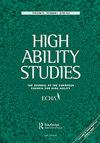Editorial
IF 1.3
4区 教育学
Q2 EDUCATION, SPECIAL
引用次数: 0
Abstract
This issue of the High Ability Studies focuses from various perspectives on two topics: Sports and emotions. Martin, Ewing, and Oregon are interested in the role of specialization of athletes. In line with recent findings in skill development in the arts and in the academics, they find that early specialization is not required for an elite level performance. In the second article on sports, Tedesqui and Young investigated grit which received much attention in recent research. The authors summarized the results of their study that grit enables athletes to persist with practice activities which are crucial in expert sport development. In an article on emotions, Godor and Szymanski address an issue that has stirred up much controversy lately: Harmony theory posits that gifted students are well adjusted and successful in life, whereas disharmony theory maintains that giftedness forms a threat to a harmonious development. Analyzing PISA 2012 data, the authors found no evidence of gifted students being lonelier compared to non-gifted students. Indeed, the vast majority reported equal or higher levels of belonging. Thus, the results were clearly more concordant with harmony theory. In a highly interesting study, Hornstra, van der Veen, and Peetsma examined the effects of full-time and part-time high ability programs on high ability students’ achievement emotions. Main findings were that students, who attended full-time high ability programs, did not report more positive achievement emotions compared to students of similar ability levels within regular education. However, students in part-time programs experienced more positive and less negative emotions during the part-time program. The concept of over-excitabilities has recently been questioned by some authors. However, De Bondt and Van Petegem present a study in which over-excitability explains variations in learning patterns ranging from 3.3% for reproduction-directed learning to impressive 46.1% for meaning-directed learning. Furthermore, the authors found evidence for including emotion dynamics in the study of the learning process. Araújo, Cruz, and Almeida conducted a study with six outstanding scientists. Some of the key findings are that emotion regulation, flexible coping, and goal setting were identified as particularly important in dealing with rejections, setbacks, and team management issues.编辑
本期《高能力研究》从不同的角度关注两个主题:运动和情感。马丁、尤因和俄勒冈州都对运动员专业化的作用感兴趣。根据最近在艺术和学术技能发展方面的研究结果,他们发现精英级别的表演不需要早期专业化。在关于体育的第二篇文章中,Tedesqui和Young研究了近年来备受关注的毅力。作者总结了他们的研究结果,即毅力使运动员能够坚持练习活动,而练习活动对专业运动的发展至关重要。Godor和Szymanski在一篇关于情感的文章中谈到了一个最近引发争议的问题:和谐理论认为天才学生在生活中适应良好并取得成功,而不和谐理论则认为天才对和谐发展构成威胁。通过分析PISA 2012年的数据,作者没有发现任何证据表明天才学生比非天才学生更孤独。事实上,绝大多数人都报告了同等或更高程度的归属感。因此,结果显然与和谐理论更加一致。在一项非常有趣的研究中,Hornstra、van der Veen和Peetsma研究了全日制和非全日制高能力项目对高能力学生成就情绪的影响。主要发现是,与普通教育中能力水平相似的学生相比,参加全日制高能力项目的学生没有表现出更多积极的成就情绪。然而,参加非全日制项目的学生在非全日制项目中经历了更多的积极情绪和更少的负面情绪。过度兴奋的概念最近受到一些作者的质疑。然而,De Bondt和Van Petergem提出了一项研究,在该研究中,过度兴奋性解释了学习模式的变化,从生殖导向学习的3.3%到意义导向学习的46.1%。此外,作者发现了将情绪动力学纳入学习过程研究的证据。Araújo、Cruz和Almeida与六位杰出科学家进行了一项研究。一些关键发现是,情绪调节、灵活应对和目标设定在处理拒绝、挫折和团队管理问题时尤为重要。
本文章由计算机程序翻译,如有差异,请以英文原文为准。
求助全文
约1分钟内获得全文
求助全文
来源期刊

High Ability Studies
Multiple-
CiteScore
4.80
自引率
11.10%
发文量
7
期刊介绍:
High Ability Studies provides a forum for scholars in a variety of disciplines associated with the development of human abilities to their highest level. It is a medium for the promotion of high ability, whether through the communication of scientific research, theory, or the exchange of practical experience and ideas. The contents of this journal are unique in reflecting concerns and recent developments in this area from childhood and across the whole life span in a variety of contexts. Far from being restricted to the traditional focus on high-level cognitive development, it also presents investigations into all other areas of human endeavour, including sport, technology, the arts, business, management and social relations.
 求助内容:
求助内容: 应助结果提醒方式:
应助结果提醒方式:


